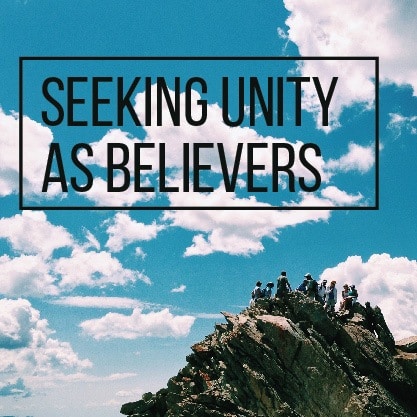Now all things are of God, who has reconciled us to Himself through Jesus Christ, and has given us the ministry of reconciliation. – 2 Corinthians 5:18
It’s a sobering matter when we sit down to talk about reconciliation. There are clear political implications in our world—just look at the wars that being waged around the globe by reason of ethnic division. My generation has witnessed unspeakable horrors, from the attempted extermination of Jews in the mid-twentieth century, to the most recent campaigns of genocide by one ethnic group against another in Africa, Europe, the Middle East and elsewhere. But reconciliation is not a political issue. It is a spiritual and moral issue because it cuts to the core of the human inclination to separate ourselves.
And He has made from one blood
every nation of men to dwell on all the face of the earth. – Acts 17:26
This passage of Scripture reminds us that we are all one blood, derived from one earthly father, in whom God, with incredible creativity, put the genetic capacity to sire a race that would have as many different expressions as we do in this world. Hear me, please—there are not different races. There is only one race—the human race, of which we are all members—whatever ethnicity or nationality we may be. Why then, if there was only one father of our human race, are there so many different expressions of our physical humanity, in terms of facial features, skin coloring and so forth? Because the Creator who breathed the seeds of life into that created being, making him the father of a global population, wanted those created in His image to be as varied and as creatively representative of Himself as we are.
It is the heart-prayer of our Savior Jesus Christ that the people of God may be one. Jesus prays to the Father, “that they all may be one, as You, Father, are in Me, and I in You; that they also may be one in Us, that the world may believe that You sent Me” (John 17:21). Our unity as believers is our witness to the world of the life and truth of the living Savior, Jesus Christ.
For He Himself is our peace, who has made both one,
and has broken down the middle wall of separation. – Ephesians 2:14
The Apostle Paul, in early Church life, had to deal over and over again with the separation that existed between the Jews and the Gentiles. It’s an embarrassing fact that there never was an ideal time in the life of the Church, in terms of the need for ethnic reconciliation. The Church has always been shot through with evidences of our willingness to submit to the kingdom of the present culture more than to the requirements of the Kingdom of God. In the early Church, which was comprised mainly of Jews, there was the constant belittling and demeaning of the Gentiles. Further, once the Gentiles became believers in the Savior, they retained an attitude of superiority toward “those weird Jews” and their religious traditions. Both ethnic groups came to believe in the Messiah, the Savior, yet they still faced the dilemma of their differences, not knowing how to relate to one another.
Because the Messiah came by means of the Jewish line, this gave the Jews the opportunity to say to the Gentiles, “Now, we’ve got you. You’re going to have to live according to our system.” When the struggle ensued over rituals—especially the ritual of circumcision, which was a physical expression of the Old Testament covenant—the Gentiles refused to participate. They declared that believing in Jesus Christ as Messiah was heart faith, not part of the Mosaic tradition that reached back to the old code. Even though the importance of a “circumcised heart” was a spiritual issue, the early Church struggled bitterly over it. It’s a reminder to us that ethnic reconciliation today will not happen apart from people who come to a biblical basis of conviction about the importance of unity, as well as a prophetic awareness that This is the hour.
The twentieth century was birthed with a revival usually referred to as the “Pentecostal Revival.” It was born in a move of God that, at its inception, brought a dissolution and a disappearance of ethnic separation. The story of the Azusa Street Revival, which took place just over 100 years ago, has been cited by Dr. J. Edwin Orr as the most important of the ten primary revivals of Church history in terms of its impact. Among the profound influences resulting from this outpouring of the Holy Spirit during the past century has been His call to ethnic unity. This call continues today throughout the whole Church, irrespective of its place theologically and experientially, as far as Pentecostal tradition is concerned.
When Paul wrote to the Ephesians, he did not say, “I’m calling you to an intentional acknowledgment of your breakdown and separation as Jews and Gentiles for the sake of being nice to each other.” That’s obvious. It’s nice for people to be nice. He’s calling for reconciliation because it’s only through reconciliation that the Church can be built into one temple and, as it’s filled with the Lord’s presence and power, impact the world (Ephesians 2:19-22).
Times have changed a great deal, yet there is still a call before us to model God’s desire for reconciliation and His power to bring healing, not only in our respective communities and nations, but also to the world There doesn’t exist a nation or culture in which people are not in some way divided—it may be religious, economic or ethnic; it may be in the doctrine or theology of the Church. Yet the prophecy of Joel, fulfilled at Pentecost, still holds true for the “more” that God desires to do for “all flesh” today:
And it shall come to pass in the last days, says God,
that I will pour out of My Spirit on all flesh. – Acts 2:17
At Pentecost, when they were gathered “from every nation under heaven,” speaking a host of different languages, God was laying out His program for how things were going to be: Different nationalities and ethnic groups were coming together to worship Him—people of every tongue, root and tribe—opening to the Kingdom power of His Holy Spirit.
Beloved, we are not just going to come together ultimately in Heaven, as the Book of Revelation discloses, but God is calling us to reconciliation and unity now. The implications of this for us are so significant.
Having been given “the ministry of reconciliation,” as we daily welcome the Holy Spirit into everything that concerns us, may our mindset be, as the people of God: How can we help one another, as part of Christ’s Body, to move forward and answer the Holy Spirit’s call, not only to be reconciled to God but also, to be reconciled to one another?
Copyright 2014 by Jack W. Hayford, Jack Hayford Ministries



